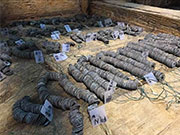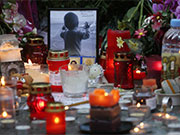

A photographer who travelled around Africa documenting tribal societies says the people were some of the happiest he'd ever met, despite their simple living conditions.
Mario Gerth, 38, from Erfurt, Germany, toured the continent over seven years and was introduced to traditional societies were people wore animal skin clothing and lived in huts made from cow dung.
'The first thing that I noticed about the tribes was how extremely happy they all are,' he says. 'They live in such harsh environments, but they bring such colour and laughter to the land.'
'The tribes have met and learnt from people from developed areas of our world before,' he explains. 'But they're content with the life that they have. They see no need to change.'
Mario travelled to the villages with a trusted guide, who had previously been accepted by the tribes as a friend.
Mario says: 'I felt extremely privileged to be able to photograph the tribes. They are very wary of new visitors at first, but once they know that you're not a threat, they become very open and welcoming.'
'A lot of people who have seen my photographs told me how they made them think about their own lives and the true meaning of true happiness.'
Mario met hundreds of different tribe members, including women with clay discs inserted into stretched piercings, warrior men and children that hunt animals for food.
During his travels the photographer visited the Arbore tribe in Ethiopia's lower Omo Valley where the way of life has barely changed for thousands of years.
People live a simple existence by the banks of the River Omo, where they hunt and raise cattle.
Women cover their heads with black cloth, but are known for their colourful necklaces and earrings, and children often wear hats that look like shells to protect their heads from the sun.
They believe in the power of song and dance to drive away negative energy, and that the tribe will prosper once this bad energy is banished.
Also in Ethiopia, Mario met women from the Surma and Muris tribes who wear enormous lip plates as a sign of beauty.
When girls hit puberty they have their bottom two teeth removed before a small hole is cut into their bottom lip.
A clay disc is then inserted into the hole, which is steadily increased, stretching the lip, much like flesh-tunnel piercings which have become popular with teenagers in the UK.
The larger the lip plate the more cows the girl's father can demand in dowry when his daughter is married - usually 40 for a small plate and 60 for a larger one.
Men on the other hand take part in the considerably less-painful ritual of body painting.
A basic paint is made from herbs and plants mixed with soil, before the tribesmen cover themselves with it, sculpting it into patterns.
In recent years, some young women from the tribes are refusing to have their lips pierced, as removing their teeth can be a violent and sometimes traumatising task.
Meanwhile, the men are known for scarring their bodies after they kill someone from an enemy tribe.
'The Suri pride themselves on their scars and how many they carry,' Mario explains.
'These rituals which are extremely painful are said by some anthropologists are a type of controlled violence; a way of getting the younger tribe members used to seeing blood and feeling pain.'
'It is also a way of adapting these young children to their violent environment.'
Another brutal tradition is an initiation rite practiced by Ethiopia's Hamar people.
Hamar men spend the majority of the time caring for cattle, which are also used to pay the dowry when the man takes a wife.
When a young man comes of age, he takes part in a cow jumping ceremony, which involves contenders attempting to leap over a row of 15 cows made extra slippery with dung.
If he fails, he cannot marry and will be beaten by the watching women.
At the same ceremony, the man's sisters and other female relatives are beaten bloody to create a blood debt so the man remembers to help them should they face tough times in the future.
Mario also visited the Samburu tribe near Lake Turkana in northern Kenya. This semi nomadic people mainly raise cattle, but also keep sheep, goats and camels.
The tribe is what's known as a gerontocracy, meaning older people hold the highest position in society and have the first choice when it comes to marriages and taking on further wives.
This means men up to the age of 30 often remain unmarried, and continue living an adolescent lifestyle.
Travelling to southern Angola, Mario visited the Mumuhuila tribe who live along the country's border with Namibia. The women are known to spend several hours each morning making themselves as beautiful as possible, and their first task is to take care of their hair.
Mario says: 'Using elements such as butter, oil, cow dung and herbs, these fascinating women can create a style out of almost everything.
'Beads, shells and colours from stones help them to create their masterpieces.'
Mario says: 'I think the biggest difference between the lives of the tribes and the western world is time.
'We're constantly measuring time, rushing to meetings, appointments; there's never enough and we're always "running out of time".'
'The tribes do not live like this - they don't measure time at all.'
'The people enjoy spending their days with their families, hunting, cooking and making things - they are some of the happiest people that I have ever met.'
 |
Day|Week

 118-meter-high Never-used Building in NW. China Demolished
118-meter-high Never-used Building in NW. China Demolished J-10B fighters with homegrown engine in test flight
J-10B fighters with homegrown engine in test flight 10 tons of copper coins unearthed in 2,000 years old ancient tomb
10 tons of copper coins unearthed in 2,000 years old ancient tomb Beautiful graduate from police college becomes Internet hit
Beautiful graduate from police college becomes Internet hit Photos of U.S. Navy intruding in South China Sea released
Photos of U.S. Navy intruding in South China Sea released What is inside China's icebreaker ‘Xuelong’?
What is inside China's icebreaker ‘Xuelong’? Chinese, U.S. navies hold first-ever joint exercise in the Atlantic
Chinese, U.S. navies hold first-ever joint exercise in the Atlantic In pics: skies of glory
In pics: skies of glory J-10, J-11, Sukhoi Su-30 fighters vs. HQ-9 anti-aircraft missile system
J-10, J-11, Sukhoi Su-30 fighters vs. HQ-9 anti-aircraft missile system Russian plane crash victims sucked out of seats as 'external impact' blew jet apart
Russian plane crash victims sucked out of seats as 'external impact' blew jet apart